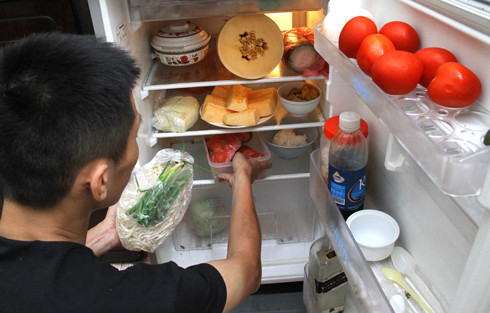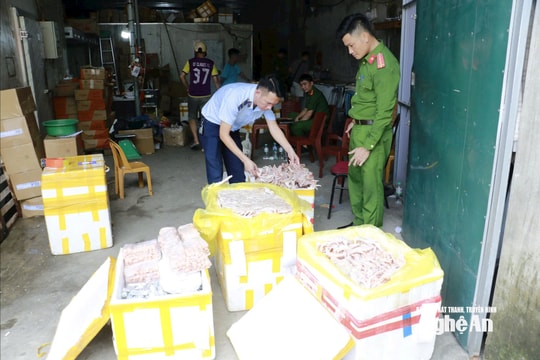Deadly mistakes when stocking food for Tet
The mentality of “being full for 3 days of Tet” still makes housewives constantly shop and stock up on food. Eating too much food that has been stored in the refrigerator for a long time, without being safe, will seriously affect health during Tet.
Housewives still buy banh chung, gio, cha, raw meat, cooked meat, dried food, green vegetables... in cold weather, they can be left outside for 5-7 days, but if the weather is humid, all of those foods must be stored in the refrigerator. Stuffing food in the refrigerator indiscriminately not only affects the preservation efficiency but also accidentally cross-contaminates the food, producing bacteria and toxins for users.
Below are some mistakes many people are making when storing food that should be avoided:
 |
Illustration photo.
Not scientifically arranged
The refrigerator is the most effective place to store food, so many people have the habit of putting everything in the refrigerator. However, some foods such as tomatoes, potatoes, garlic, watermelon... or foods such as bread, coffee... are things that if put in the refrigerator will spoil, not good for health.
In addition, mixing raw and cooked foods will create favorable conditions for bacteria to grow, leading to loss of nutrients, quick spoilage, or worse, food poisoning.
You should get into the habit of arranging food scientifically in the refrigerator, which compartment to put which food, which food is used frequently, which food is used less often... this will ensure that the ingredients are kept fresh, safe, and hygienic, and save time searching for all members.
Do not cover leftover food.
Leftover food when stored in the refrigerator if not covered tightly will not retain its flavor and will easily spoil, dangerous for health. Therefore, remember to cover food tightly every time you put it in the refrigerator. It is best to put them in a plastic box with a lid. You can also use plastic wrap to prevent the air in the refrigerator from sticking to the food, limiting spoilage.
Be careful to only use containers that have been tested for safety for freezing, as not all containers are safe for storing food in the refrigerator or freezer, especially disposable plastic items.
Not paying attention to the temperature
Temperature is a very important factor in food preservation. During “peak” days, if there is too much food in the refrigerator, the food will spoil faster.
Therefore, it is necessary to know the operating mechanism of each type of refrigerator because the cold air emitted in each compartment is different to store food appropriately. The temperature in the refrigerator compartment must always be below 4 degrees Celsius, and the freezer compartment is best below -18 degrees Celsius. Temperatures above 4 degrees Celsius will cause bacteria to grow very quickly.
Do not wash fresh meat before freezing.
Many people, when they bring home meat, put it all in bags and put it in the freezer. This will destroy all the nutrients and flavor of the meat. Therefore, you need to freeze meat properly.
First, wash the meat, then dry it and put it in a food bag or a separate food storage box and write the date on it before freezing. Because if you do not wash the meat, dirt and bacteria will stick to the meat, which is not good.
Refreeze meat after use
Many people think that after thawing meat that is not eaten, they put it back in the freezer to freeze again. However, this method unintentionally increases the bacteria growth rate many times over. Any cells that escape the breakdown process when the food is first frozen are at risk of being broken down again. Therefore, we do not refreeze food after thawing and eating leftovers.
Not cleaning the refrigerator regularly
Regularly cleaning the refrigerator not only helps our refrigerator to be clean and operate effectively, but also helps keep food stored in the refrigerator fresh and not spoiled.
Also, do not leave your hands full of food when opening the refrigerator, because when your hands come into direct contact with foods containing a lot of bacteria, they will be transferred to other ingredients, causing cross-contamination.
According to Viet nam.net
| RELATED NEWS |
|---|





.jpg)


